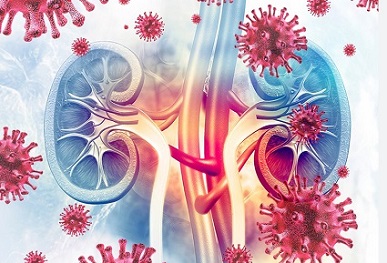Study Shows That Kidney Function And eGFR Decreases At Six Months After SARS-CoV-2 Infection For Long COVID Patients
Nikhil Prasad Fact checked by:Thailand Medical News Team Apr 26, 2024 1 year, 4 hours, 15 minutes ago
COVID-19 News: As the world grappled with the acute phase of the respiratory syndrome coronavirus 2 (SARS-CoV-2) infection, attention swiftly shifted to the long-term repercussions, now commonly referred to as Post-COVID Syndrome or “Long COVID.” This comprehensive condition spans an array of persistent symptoms and clinical manifestations that endure beyond the initial infection, impacting various organ systems. While respiratory and cardiovascular sequelae have been extensively studied, the focus on renal complications has gained prominence due to emerging evidence suggesting a link between SARS-CoV-2 infection and kidney dysfunction. This
COVID-19 News report delves into a study conducted by researchers from “Victor Babes” University of Medicine and Pharmacy Timisoara-Romania, D.Y. Patil Medical College Kolhapur-India, Misr University for Science & Technology-Egypt, Cardioprevent Foundation-Romania and “Vasile Goldis” Western University-Romania to evaluate kidney function tests six months after SARS-CoV-2 infection in patients clinically diagnosed with Post-COVID Syndrome, with a specific focus on continuous estimated glomerular filtration rate (eGFR) decrease as a key outcome.
 Kidney Function And eGFR Decreases At Six Months After
Kidney Function And eGFR Decreases At Six Months After
SARS-CoV-2 Infection For Long COVID Patients
The Study Design: Investigating Renal Health Post-COVID-19
The study adopted a retrospective observational approach involving adults who had laboratory-confirmed SARS-CoV-2 infection and were clinically diagnosed with Post-COVID Syndrome. Notably, individuals with prior chronic kidney disease or significant renal impairment were excluded from the study cohort. Key renal function tests, including serum creatinine, blood urea nitrogen (BUN), eGFR, proteinuria, and hematuria, were meticulously analyzed to assess renal health six months post-infection. The study's hypothesis centered on the persistence of renal dysfunction in Post-COVID Syndrome patients, indicating potential long-term implications for kidney function.
Results
-Patients’ Background: Demographics and Health Variables
A thorough demographic analysis of participants revealed significant differences between the control group and the Post-COVID group. While age, gender distribution, and BMI did not exhibit statistically significant variations, noteworthy contrasts were observed in COVID-19 vaccination status, antiviral medication requirement, and kidney injury outcomes. The Post-COVID group displayed higher incidences of acute kidney injury (AKI) during admission and continuous eGFR decrease below 30 at six months post-infection, indicating sustained renal impairment in this cohort.
-Laboratory Data: Insights Into Renal Function Parameters
Analysis of laboratory data showcased marked differences in renal function parameters between the Post-COVID group and the control group. Elevated serum creatinine, decreased eGFR, and e
levated BUN levels were notable in the Post-COVID group, signifying ongoing renal impairment six months post-SARS-CoV-2 infection. While improvements were observed in some kidney function metrics, such as eGFR and markers of renal damage, persistent abnormalities highlighted the potential for long-lasting renal consequences post-COVID-19.
Among 206 participants, significant differences were observed between the control (n = 114) and the Post-COVID group (n = 92). The Post-COVID group exhibited higher serum creatinine (109.7 μmol/L vs. 84.5 μmol/L, p < 0.001), lower eGFR (65.3mL/min/1.73 m2 vs. 91.2 mL/min/1.73 m2, p < 0.001), and elevated BUN levels (23.7 mg/dL vs. 15.2 mg/dL, p < 0.001) compared to the control group. Regression analysis highlighted significant predictors of continuous eGFR decrease <30 at six months post-infection. The development of acute kidney injury (AKI) during the initial COVID-19 illness emerged as a strong predictor of reduced eGFR (β = 3.47, p < 0.001). Additional factors, including a creatinine increase (23 μmol/L above the normal range) and an elevated Albumin to Creatinine Ratio (ACR) (>11 mg/g above the normal range), were significantly associated with eGFR reduction.
Patients with Post-COVID Syndrome demonstrate significant renal impairment six months post-SARS-CoV-2 infection.
-Risk Assessment: Predictors of Renal Function Decline
Risk assessment revealed several significant predictors of continuous eGFR decrease below 30 at six months post-infection. Severe COVID-19 severity, AKI development, increases in creatinine levels and Albumin to Creatinine Ratio (ACR), and BUN increases were identified as strong indicators of sustained renal function decline. These findings underscore the intricate relationship between COVID-19 severity, acute kidney injury, and long-term renal health outcomes.
Literature Findings: Synthesizing Insights from Existing Research
The study's findings align with previous research highlighting the heightened risks and outcomes of COVID-19 on individuals with pre-existing kidney conditions. Studies have emphasized the increased incidence of acute kidney injury and the progression to chronic kidney disease post-COVID-19 infection, underscoring global challenges in managing renal complications amidst the pandemic. The nuanced interplay between COVID-19 severity, genetic predisposition, and renal function further complicates prognostic assessments and therapeutic strategies.
Clinical Implications: Navigating Long-Term Renal Health in Post-COVID Care
The study's outcomes emphasize the imperative for ongoing renal health monitoring and tailored intervention strategies in Post-COVID Syndrome patients. With identified risk factors for sustained renal impairment, healthcare providers can adopt a more targeted approach to post-COVID care, mitigating long-term renal consequences and improving patient outcomes. This underscores the holistic management of Post-COVID Syndrome, integrating renal health considerations into comprehensive care plans for affected individuals.
Conclusions: Addressing the Long-Term Renal Impact of COVID-19
In conclusion, the study sheds light on the significant impact of COVID-19 on long-term renal health, particularly in patients with Post-COVID Syndrome. The identification of key predictors for renal function decline underscores the urgency of proactive renal health management and continuous monitoring in recovering COVID-19 patients. By addressing the chronic renal implications of Post-COVID Syndrome, healthcare providers can optimize patient care and mitigate the long-term burden on renal health systems globally. Future research endeavors are encouraged to delve deeper into the intricacies of COVID-19's impact on renal function, encompassing diverse global scenarios and therapeutic interventions.
The study findings were published in the peer reviewed journal: Biomedicines
https://www.mdpi.com/2227-9059/12/5/950
For the latest
COVID-19 News, keep on logging to Thailand Medical News.
Read Also:
https://www.thailandmedical.news/news/german-study-warns-that-sars-cov-2-infections-are-causing-acute-kidney-injury-and-kidney-damage
https://www.thailandmedical.news/news/covid-19-induced-kidney-damage-caused-by-sars-cov-2-using-receptors-such-as-tlr-4-kim-1-tim-1-and-cd147
https://www.thailandmedical.news/news/more-than-one-third-of-children-who-had-post-covid-19-multisystem-inflammatory-syndrome-developed-acute-kidney-injury
https://www.thailandmedical.news/news/covid-19-news-italian-doctors-warn-that-sars-cov-2-can-cause-water-balance-disorders-due-to-damage-caused-to-the-kidneys
https://www.thailandmedical.news/news/covid-19-news-study-finds-that-sars-cov-2-nucleocapsid-protein-accumulates-in-renal-tubular-epithelium-of-post-covid-19-patients,-possibility-causing-
https://www.thailandmedical.news/news/covid-19-news-insights-into-the-mechanism-behind-covid-19-induced-acute-kidney-injury-and-the-potential-therapeutic-role-of-quercetin
https://www.thailandmedical.news/news/covid-19-news-german-study-finds-that-urinary-n-terminal-pro-brain-natriuretic-peptide-predicts-acute-kidney-injury-and-severe-disease-in-covid-19
https://www.thailandmedical.news/news/japanese-study-finds-that-sars-cov-2-mediated-kidney-injury-can-be-prevented-by-inhibition-of-toll-like-receptor-4-and-interleukin-1-receptor
https://www.thailandmedical.news/news/breaking-news-fibrotic-events-in-kidneys-may-initiate-early-in-sars-cov-2-infection,-leading-to-pronounced-kidney-fibrosis-in-long-covid
https://www.thailandmedical.news/news/thailand-medical-news-warns-that-covid-19-infections-and-vaccinations-are-driving-exponential-incidences-of-acute-kidney-injury
https://www.thailandmedical.news/news/study-shockingly-shows-that-many-exposed-to-the-sars-cov-2-omicron-variant-exhibit-hematuria-and-proteinuria-early-signs-of-possible-kidney-damage
https://www.thailandmedical.news/news/breaking-sars-cov-2-infections-can-cause-downregulation-of-fumarate-hydratase,-leading-to-chronic-inflammation-and-renal-carcinoma
https://www.thailandmedical.news/news/covid-19-news-study-finds-that-non-omicron-variants-more-likely-to-cause-damage-to-the-kidney-s-filtration-system-than-omicron-sublineages
https://www.thailandmedical.news/news/breaking-covid-19-news-french-researchers-warn-that-post-covid-children-and-teenagers-are-at-risk-of-developing-kidney-disease
https://www.thailandmedical.news/news/breaking-covid-19-news-sars-cov-2-orf3a-protein-damages-renal-tubules-via-trim59-induced-stat3-activation-causing-acute-kidney-injury
https://www.thailandmedical.news/news/breaking-are-certain-newer-sars-cov-2-variants-causing-a-rise-in-chronic-kidney-disease-and-kidney-failure-in-countries-like-singapore-and-thailand
https://www.thailandmedical.news/news/breaking-u-s-cdc-reports-high-incidences-of-kidney-failure,-clots,-diabetes-and-heart-issues-in-post-covid-children-and-teenagers
https://www.thailandmedical.news/news/university-of-queensland-study-warns-that-millions-of-sars-cov-2-infected-individuals-are-not-aware-that-they-may-have-undiagnosed-acute-kidney-injury
https://www.thailandmedical.news/news/dutch-and-german-study-shows-that-sars-cov-2-directly-infects-the-kidneys-and-causes-tissue-scarring-which-ultimately-leads-to-kidney-damage-and-failu
https://www.thailandmedical.news/news/university-of-washington-study-confirms-that-sars-cov-2-can-directly-invade-human-kidney-cells-causing-a-range-of-kidney-issues-including-acute-kidney
https://www.thailandmedical.news/news/more-great-news-even-those-that-initially-had-mild-covid-19-symptoms-can-develop-kidney-disease-as-part-of-many-manifestations-of-long-covid
https://www.thailandmedical.news/news/good-news-study-finds-that-most-recovered-covid-19-patients-even-with-mild-infections-will-ultimately-develop-virus-induced-kidney-damage
https://www.thailandmedical.news/news/study-finds-that-covid-19-induced-acute-kidney-injury-similar-to-sepsis-caused-kidney-injury-and-that-mitochondrial-dysfunction-may-play-a-key-role
https://www.thailandmedical.news/news/covid-19-diagnostics-researchers-uncover-new-protein-biomarker-supar-to-identify-covid-19-patients-at-risk-of-acute-kidney-injury-aki
https://www.thailandmedical.news/news/warning-covid-19-latest-researchers-warn-of-epidemic-of-post-covid-19-kidney-disease-and-study-shows-many-will-die-or-never-recover-from-aki
https://www.thailandmedical.news/news/covid-19-study-latest-autopsy-study-by-imperial-college-london-shows-extensive-blood-clots,-massive-lung-and-kidney-injuries-along-with-new-findings
https://www.thailandmedical.news/news/sars-cov-2-attacks-kidney-proximal-tubular-cells-causing-acute-fanconi-syndrome-according-to-french-study
https://www.thailandmedical.news/news/acute-kidney-injury-study-shows-that-acute-kidney-injury-(aki)-predominant-among-covid-19-patients
https://www.thailandmedical.news/news/covid-19-clinical-care-kidney-failure-emerging-as-a-common-occurrence-from-covid-19-infections
https://www.thailandmedical.news/news/breaking-more-emerging-chinese-research-studies-shows-that-the-sars-cov-2-coronavirus-also-attacks-the-kidneys,-pancreas-and-liver
https://www.thailandmedical.news/news/university-of-arkansas-study-finds-that-tocilizumab-increases-risk-of-fungal-infections-and-acute-renal-failure-in-critically-ill-covid-19-patients
https://www.thailandmedical.news/news/the-impact-of-jak-inhibitors-such-as-baricitinib-on-kidney-injury-in-early-covid-19
https://www.thailandmedical.news/news/breaking-covid-19-drugs-remdesivir-approved-by-trumps-administration-causes-serious-kidney-problems-eu-regulators-starts-safety-review
